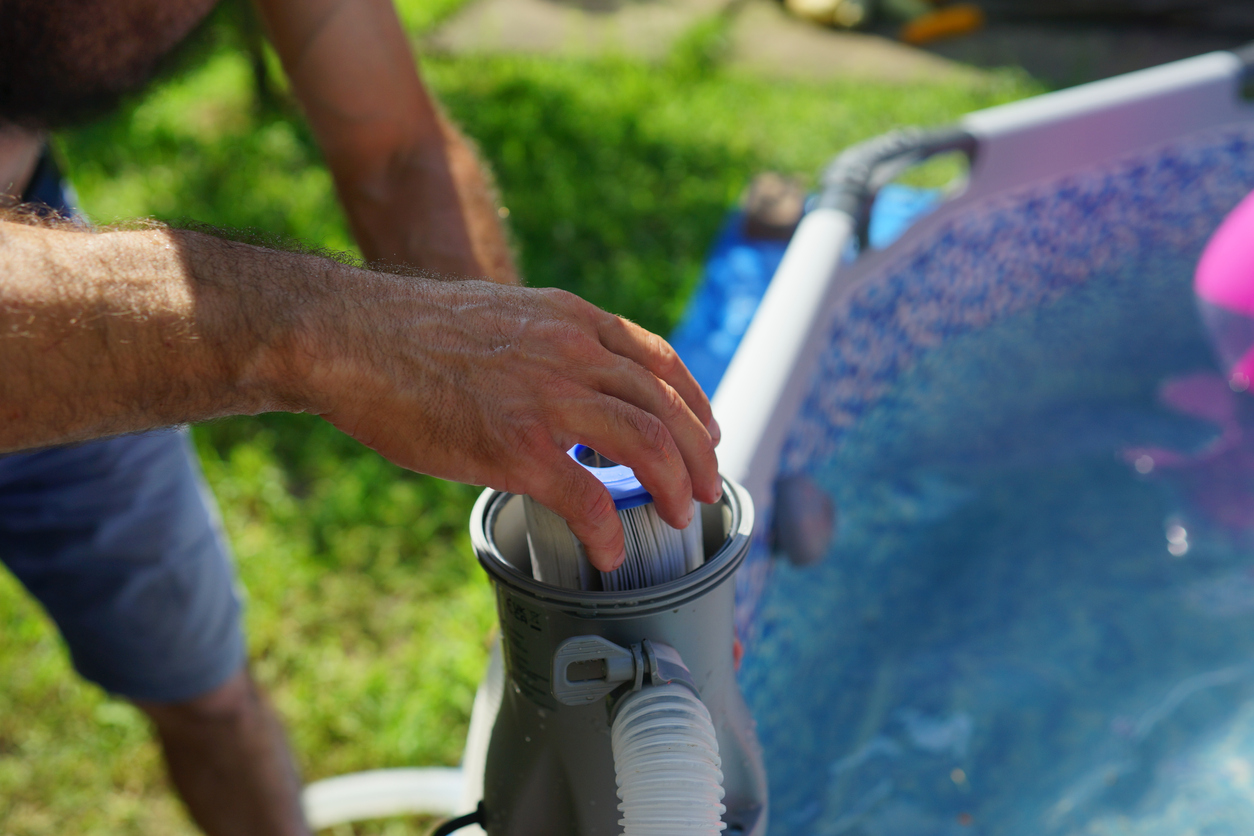
A Guide To Cleaning Pool Filters
The joy that comes with owning a pool is unparalleled. However, to ensure your pool stays crystal clear and inviting all yearlong, it’s key you exercise proper caution when it comes to cleaning and maintenance. At the center of it all is your pool filter, which is the backbone of your circulation system.
In this guide from the experts at SPS PoolCare, we’ll explore the importance of cleaning your pool filters. We’ll dive into the main types of pool filters and provide practical and simple cleaning instructions for them all. By understanding the significance of proper pool filter maintenance, you can make owning your pool a joy.
Why Do I Need To Clean My Pool Filter?
Before we explore the nitty-gritty details, let’s emphasize why cleaning your pool filters is important. The filtration of your pool plays a pivotal role in keeping its water clear of debris, contaminants, and microscopic particles. Over time, these filters become clogged and less efficient, which can lead to poor water circulation, decreased filtration capacity, and potentially unhealthy water conditions.
When your pool filter is clean and functioning optimally, it helps maintain balanced water chemistry, prevents algae growth, and ensures your pool water is safe and enjoyable for swimmers. Neglecting filter maintenance can also be quite expensive, as it can lead to costly repairs and increased energy consumption.
Types of Pool Filters
There are three main types of pool filters, including sand filters, cartridge filters, and diatomaceous earth (DE) filters. Each kind of pool filter has its own set of advantages and cleaning requirements.
Sand Filters
Sand filters, known for their durability and ease of use, are one of the most common types of pool filters. These filters contain a tank filled with special-grade pool filter sand, which traps debris and particles as water passes through. Cleaning a sand filter is a relatively straightforward process.
How To Clean Sand Pool Filters
The primary method for cleaning a sand filter is backwashing. Turn off the pump, set the multiport valve to the “backwash” position, and turn the pump back on. Let the water flow in reverse, flushing out the trapped debris and contaminants. Repeat until the water in the sight glass runs clear.
After backwashing, set the multiport valve to the “rinse” position and run the pump for a brief period of time. This helps settle the sand bed. You should also periodically check the pressure gauge on your sand filter. A significant increase in pressure indicates the need for backwashing.
Cartridge Filters
Cartridge filters use replaceable filter carts to trap impurities from the pool water. These filters offer excellent results and are relatively low maintenance for the pool owner.
Cleaning Instructions for Cartridge Filters
To begin cleaning your cartridge filter, turn off the pump and remove the cartridge from its housing. After that, use a garden hose to rinse off loose debris. For a more thorough cleaning, soak the cartridge in a solution of water and a specialized filter cleaner. Depending on usage and water conditions, you should expect to replace cartridge filters every one or two years.
Diatomaceous Earth (DE) Filters
Diatomaceous earth filters use a fine powder made from fossilized diatoms for superior filtration. While highly effective, DE filters require more meticulous cleaning compared to other types of pool filters.
Cleaning Instructions for DE Filters
Similar to sand filters, DE filters require regular backwashing. Start by setting the multiport valve to the “backwash” position and run the pump until the water runs clear. After that, the DE filter needs to be recharged with fresh diatomaceous earth powder. Follow the manufacturer’s guidelines to ensure you use the correct amount. At least once a year, moving forward, perform a thorough cleaning by disassembling the filter, cleaning the grids, and inspecting for damage.
Recognizing the Need for Cleaning
Regularly cleaning your pool’s components is key. But how do you know how often to clean your pool filters? Here are some signs to look out for.
- Increased pressure. A rise in the pressure gauge reading is a clear indicator of a clogged filter.
- Reduced water flow. If you notice decreased water flow from your return jets, it may be due to a clogged filter impeding circulation.
- Cloudy water. Murky or cloudy water suggests your filter is no longer effectively removing impurities.
- Algae growth. Algae thrive in poorly filtered water. If you spot algae growth, it’s time to address your filter.
How Often Should I Clean My Pool Filters?
How often you clean your pool filters depends on various factors, including pool usage, environmental conditions, and the type of filter. However, here are some general guidelines to follow.
- Sand filters. Backwash as needed, usually when the pressure gauge rises by 7 to 10 psi.
- Cartridge filters. Rinse cartridges every two to four weeks and replace them annually or biannually.
- DE filters. Backwash when the pressure gauge rises by 7 to 10 psi, and perform a full teardown cleaning at least once a year.
Safety Precautions
It’s important to keep certain safety precautions and practices in mind when doing any sort of pool maintenance and cleaning. Before attempting to work on your pool filter, always turn off the pump to avoid injury. You should also use gloves and eye protection, especially when handling filter cartridges or diatomaceous earth.
Generally speaking, adhere to the manufacturer’s recommendations for cleaning and maintenance to prevent unnecessary damage to your filter system and the rest of your pool. For major repairs or issues you can’t handle on your own, consult with the experts at SPS PoolCare.
Pool Filter Cleaning and Maintenance With SPS PoolCare
A clean and well-maintained pool filter is the key to keeping your pool a sparkling and inviting oasis. By recognizing the signs you need to clean your pool filter and following proper maintenance practices, you can ensure you and your loved ones have a healthy and enjoyable swimming experience all yearlong.
The friendly professional technicians at SPS PoolCare are ready to assist with all your pool cleaning and maintenance service needs. Whether you require a full filter replacement, a simple repair, or regular cleaning, we have the knowledge and tools to get you back relaxing in the water in no time. Find your closest SPS PoolCare branch today to get started!


